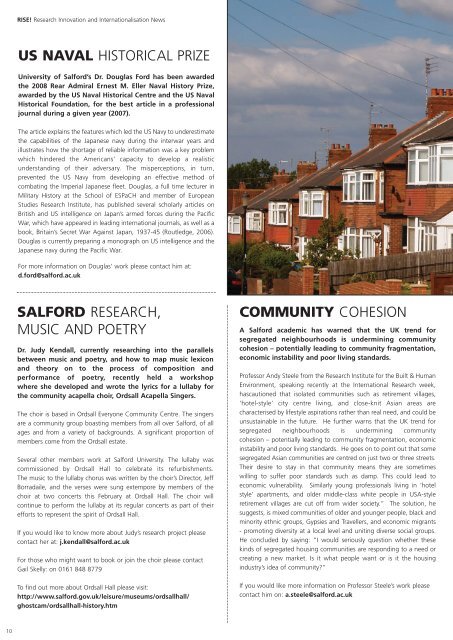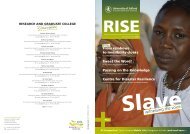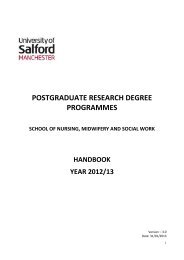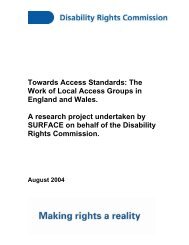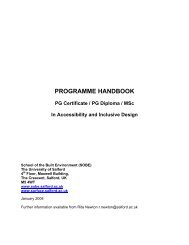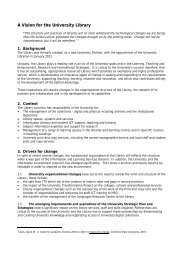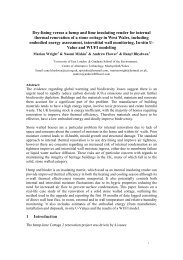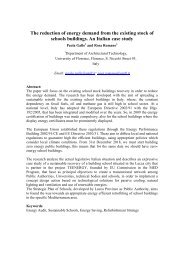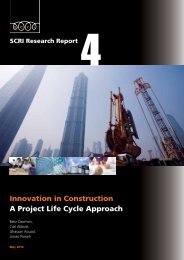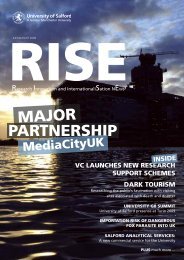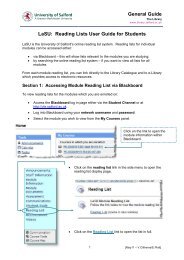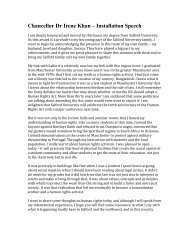RISE May-June 2009 - University of Salford
RISE May-June 2009 - University of Salford
RISE May-June 2009 - University of Salford
Create successful ePaper yourself
Turn your PDF publications into a flip-book with our unique Google optimized e-Paper software.
<strong>RISE</strong>! Research Innovation and Internationalisation News<br />
US NAVAL HISTORICAL PRIZE<br />
<strong>University</strong> <strong>of</strong> <strong>Salford</strong>’s Dr. Douglas Ford has been awarded<br />
the 2008 Rear Admiral Ernest M. Eller Naval History Prize,<br />
awarded by the US Naval Historical Centre and the US Naval<br />
Historical Foundation, for the best article in a pr<strong>of</strong>essional<br />
journal during a given year (2007).<br />
The article explains the features which led the US Navy to underestimate<br />
the capabilities <strong>of</strong> the Japanese navy during the interwar years and<br />
illustrates how the shortage <strong>of</strong> reliable information was a key problem<br />
which hindered the Americans’ capacity to develop a realistic<br />
understanding <strong>of</strong> their adversary. The misperceptions, in turn,<br />
prevented the US Navy from developing an effective method <strong>of</strong><br />
combating the Imperial Japanese fleet. Douglas, a full time lecturer in<br />
Military History at the School <strong>of</strong> ESPaCH and member <strong>of</strong> European<br />
Studies Research Institute, has published several scholarly articles on<br />
British and US intelligence on Japan’s armed forces during the Pacific<br />
War, which have appeared in leading international journals, as well as a<br />
book, Britain’s Secret War Against Japan, 1937-45 (Routledge, 2006).<br />
Douglas is currently preparing a monograph on US intelligence and the<br />
Japanese navy during the Pacific War.<br />
For more information on Douglas’ work please contact him at:<br />
d.ford@salford.ac.uk<br />
SALFORD RESEARCH,<br />
MUSIC AND POETRY<br />
Dr. Judy Kendall, currently researching into the parallels<br />
between music and poetry, and how to map music lexicon<br />
and theory on to the process <strong>of</strong> composition and<br />
performance <strong>of</strong> poetry, recently held a workshop<br />
where she developed and wrote the lyrics for a lullaby for<br />
the community acapella choir, Ordsall Acapella Singers.<br />
The choir is based in Ordsall Everyone Community Centre. The singers<br />
are a community group boasting members from all over <strong>Salford</strong>, <strong>of</strong> all<br />
ages and from a variety <strong>of</strong> backgrounds. A significant proportion <strong>of</strong><br />
members come from the Ordsall estate.<br />
Several other members work at <strong>Salford</strong> <strong>University</strong>. The lullaby was<br />
commissioned by Ordsall Hall to celebrate its refurbishments.<br />
The music to the lullaby chorus was written by the choir’s Director, Jeff<br />
Borradaile, and the verses were sung extempore by members <strong>of</strong> the<br />
choir at two concerts this February at Ordsall Hall. The choir will<br />
continue to perform the lullaby at its regular concerts as part <strong>of</strong> their<br />
efforts to represent the spirit <strong>of</strong> Ordsall Hall.<br />
If you would like to know more about Judy’s research project please<br />
contact her at: j.kendall@salford.ac.uk<br />
For those who might want to book or join the choir please contact<br />
Gail Skelly: on 0161 848 8779<br />
To find out more about Ordsall Hall please visit:<br />
http://www.salford.gov.uk/leisure/museums/ordsallhall/<br />
ghostcam/ordsallhall-history.htm<br />
COMMUNITY COHESION<br />
A <strong>Salford</strong> academic has warned that the UK trend for<br />
segregated neighbourhoods is undermining community<br />
cohesion – potentially leading to community fragmentation,<br />
economic instability and poor living standards.<br />
Pr<strong>of</strong>essor Andy Steele from the Research Institute for the Built & Human<br />
Environment, speaking recently at the International Research week,<br />
hascautioned that isolated communities such as retirement villages,<br />
‘hotel-style’ city centre living, and close-knit Asian areas are<br />
characterised by lifestyle aspirations rather than real need, and could be<br />
unsustainable in the future. He further warns that the UK trend for<br />
segregated neighbourhoods is undermining community<br />
cohesion – potentially leading to community fragmentation, economic<br />
instability and poor living standards. He goes on to point out that some<br />
segregated Asian communities are centred on just two or three streets.<br />
Their desire to stay in that community means they are sometimes<br />
willing to suffer poor standards such as damp. This could lead to<br />
economic vulnerability. Similarly young pr<strong>of</strong>essionals living in ‘hotel<br />
style’ apartments, and older middle-class white people in USA-style<br />
retirement villages are cut <strong>of</strong>f from wider society.” The solution, he<br />
suggests, is mixed communities <strong>of</strong> older and younger people, black and<br />
minority ethnic groups, Gypsies and Travellers, and economic migrants<br />
- promoting diversity at a local level and uniting diverse social groups.<br />
He concluded by saying: “I would seriously question whether these<br />
kinds <strong>of</strong> segregated housing communities are responding to a need or<br />
creating a new market. Is it what people want or is it the housing<br />
industry’s idea <strong>of</strong> community”<br />
If you would like more information on Pr<strong>of</strong>essor Steele’s work please<br />
contact him on: a.steele@salford.ac.uk<br />
10


